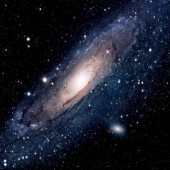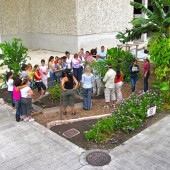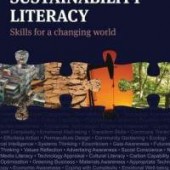
Abstract: Inspired by the entanglements of the Cosmos, this essay is a response to the JSE special call for papers on future casting sustainability education. The author’s approach reflects an integrated view of humans, moving beyond Anthropocene, capitalism, and Donald Trump to the idea of the Chthulucene, an era of reciprocity amongst human and more-than-human. In challenging times, such as this, sustainability education can look towards the future through hopeful pedagogies of interconnection through reciprocity, storytelling, and embracing the bio-cultural diversity of Earth.
Continue Reading
In this fascinating case study from Miami Dade College, Anouchka provides us with a detailed and subtle look at the effects of a simple school garden on her students. The garden’s potential to build a sense of community and place as well as a new environmental ethic is developed through vivid vignettes woven throughout the description of how Anouchka and her colleagues launched the project. The garden project described is a powerful example of complex, interdisciplinary teaching that also takes advantage of the college’s physical campus to foster experiential learning and cultural exchange. Whether or not readers are involved in similar projects, this story is important for its illustration of the interconnectivity and endless learning possible in any discipline from a connection to the living earth.
Continue Reading
In this detailed and insightful review, Laura Henry-Stone admires the breadth and cohesiveness of this edited volume from mostly European sustainability educators. She makes a good case for bringing this wide array of pieces under one cover, for avoiding static definitions of sustainability, even the traditional “triple bottom line”, and rather looking outside reductionist approaches to find integration, inter-relation and the kind of broad strokes that the chapters in this book propose for educating and solving for sustainability.
Continue ReadingThis case describes how four teacher candidates, placed for a year-long internship in an elementary school with a garden, learned to teach for sustainability. Evidence from the interns’ Teacher Work Samples, survey data, interviews, and observational data are used to assess the extent to which teacher candidates demonstrated the knowledge, skills and dispositions to teach […]
Continue ReadingIf educators are to effectively prepare learners with the knowledge, skills, and values they will need for creating more sustainable places and communities, a transition must be made from transmissive teaching models to transformative learning processes. But how can courses be designed or redesigned so that they create opportunities for transformational sustainability learning, and how […]
Continue Reading